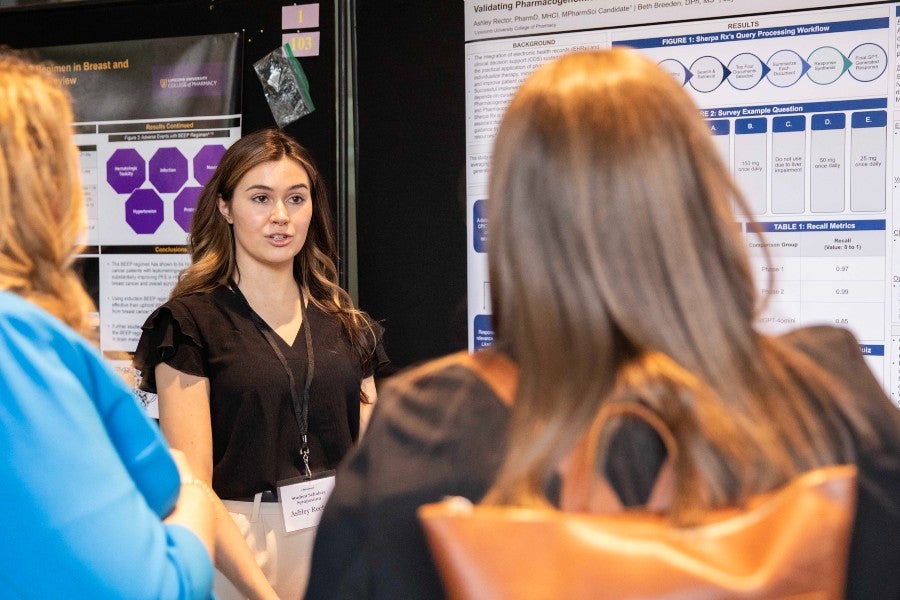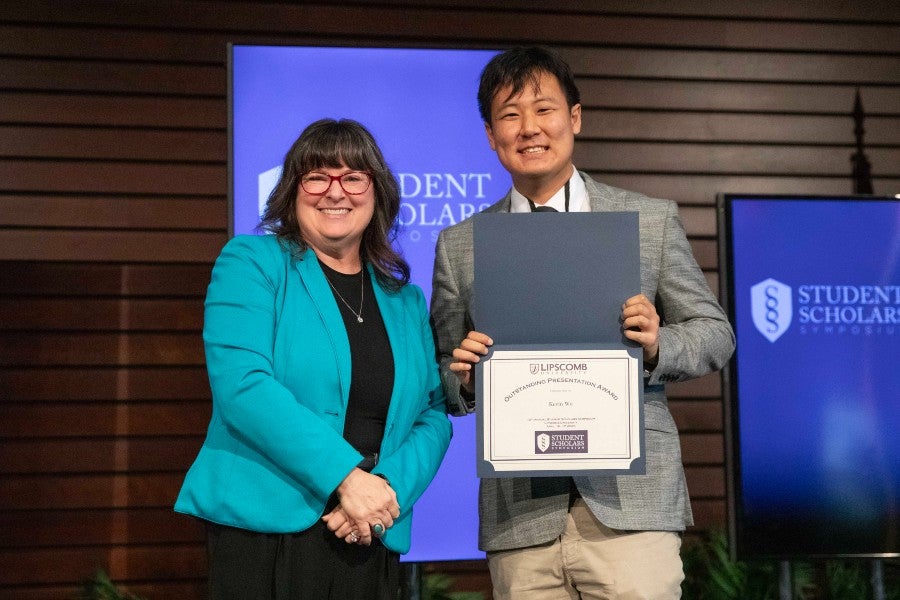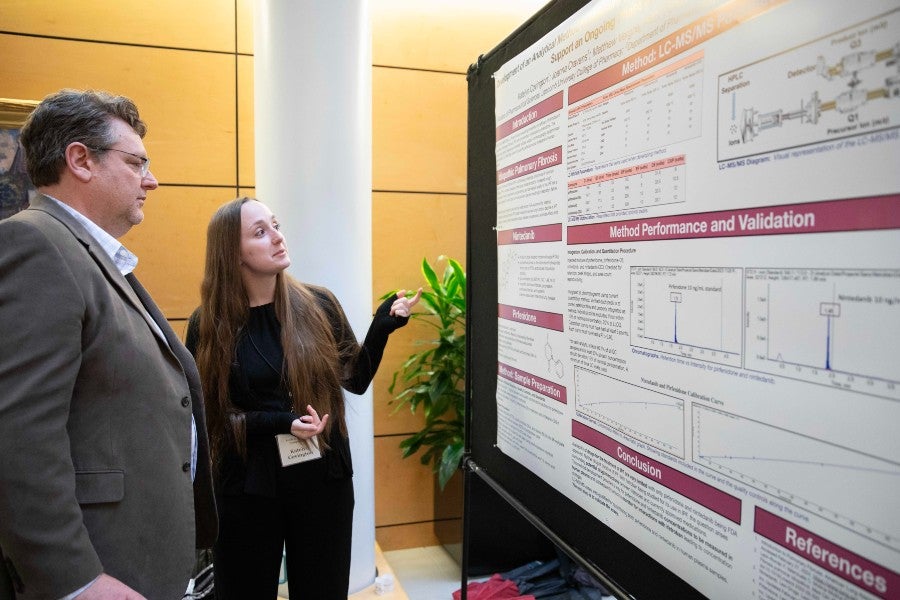College of Pharmacy graduates first four master’s students
Two graduates earn pharmaceutical sciences and health care informatics masters along with their pharmacy doctorates.
By Janel Shoun-Smith | 615-966-7078 |

Ashley Rector, who received three graduate degrees at commencement this May, presenting the results of her health care informatics research project at the 2025 Student Scholars Symposium.
This past May marked the graduation of the first four Master of Pharmaceutical Science students from the College of Pharmacy.
Kevin Wu, Joanna Cravens, Ashley Rector and Katelyn Covington all graduated on May 3 with a Doctorate of Pharmacy and the new master’s degree focused on applied drug development research. In addition, Rector and Covington also earned a third degree: a Master of Health Care Informatics during their four years of pharmacy study.
Established in 2023, the pharmaceutical science master’s was designed to prepare students to continue on to a Ph.D. in pharmacology or to go directly into the pharmaceutical industry workforce as research scientists, an area of high workforce demand in contract research organizations or pharmaceutical companies.
All four students had two years of opportunities to conduct real-world applied drug discovery and clinical development research in Lipscomb’s labs and through its on-campus industry partner, Inotiv, a nationwide contract research organization.
“I thought that down the road I could see myself maybe exploring an industry position, and this master’s degree gave me a background on the industry side of things. It made me more well-rounded and able to fit in areas that a PharmD degree-holder may not usually fit in,” said Rector.

Kevin Wu, one of the inaugural graduates in the pharmaceutical sciences master's program, received an outstanding presenter honor at the 2025 Student Scholars Symposium.
In 2024-2025, Rector, from Cookeville, worked not only on a pharmacokinetic research project in collaboration with Inotiv, but she also carried out a health care informatics project for a start-up company called SherpaRX, which is developing an AI digital platform for physicians.
Working with Scott Akers, executive director of the Pharmaceutical Sciences Research Center and associate dean of research, Rector determined the most effective dosage and timing of doses of three novel compounds given to mice, and then used Phoenix Software to scale those results up to doses sized for humans, moving the compounds one step closer to being used in clinical trials for humans.
Working with Jay Dorris (LA ’07, PharmD ’14), assistant professor of pharmacy practice, Rector developed a systematic process to test and evaluate the responses of the Helix AI platform used by SherpaRx to provide rapid pharmacogenomic information to physicians as they are providing personalized drug therapies.
The Helix AI is learning how to provide the best information through retrieval-augmented generation (RAG) of data compiled in the Clinical Pharmacogenetics Implementation Consortium (CPIC) and Pharmacogenomics Knowledgebase (PharmGKB).
Rector worked with SherpaRX’s coders, providing suggestions based on her pharmacy expertise. For her research project she developed 10 queries for SherpaRx’s system and compared its responses to three other AI models, finding that the SherpaRX model outperformed the other three in accuracy, relevance, completeness, clarity and coherence.
“I’ve always liked research, but I didn’t realize all the opportunities that exist in pharmaceutical research until I began studying at Lipscomb,” said Rector. “It doesn’t have to be just a retail job or even a hospital position. There are lots of roles in pharmacy, and I’m really glad that I found them.”

Katelyn Covington presents her research findings to Associate Dean Scott Akers at the 2024 Student Scholars Symposium.
During their pharmacy studies, Cravens and Covington worked on a project developing a way to measure the levels of three separate drugs in the blood, in support of a human clinical trial using ifetroban to treat patients with idiopathic pulmonary fibrosisl. They also both worked on a project titled “Have you had your vitamins today? An LC-MS/MS method to simultaneously measure B vitamins in plasma from study participants in a ‘greens’ nutritional supplement clinical trial.”
Both of these projects were presented at Liscomb’s annual Student Scholars Symposium.
Wu conducted tests on a novel peptide drug to see if it is effectively absorbed into the body to treat heart arrhythmias. Wu, a Nashville native with a chemistry and engineering bachelor’s degree, found that only 16% of the drug administered as an oral dosage form reached the bloodstream.
At the 2025 Student Scholars Symposium, Wu presented “In Vitro and In Vivo Preclinical Development of the Cyclopeptide Ent-Verticilide for the Treatment of Cardiac Arrhythmias,” and won outstanding presenter in his session.